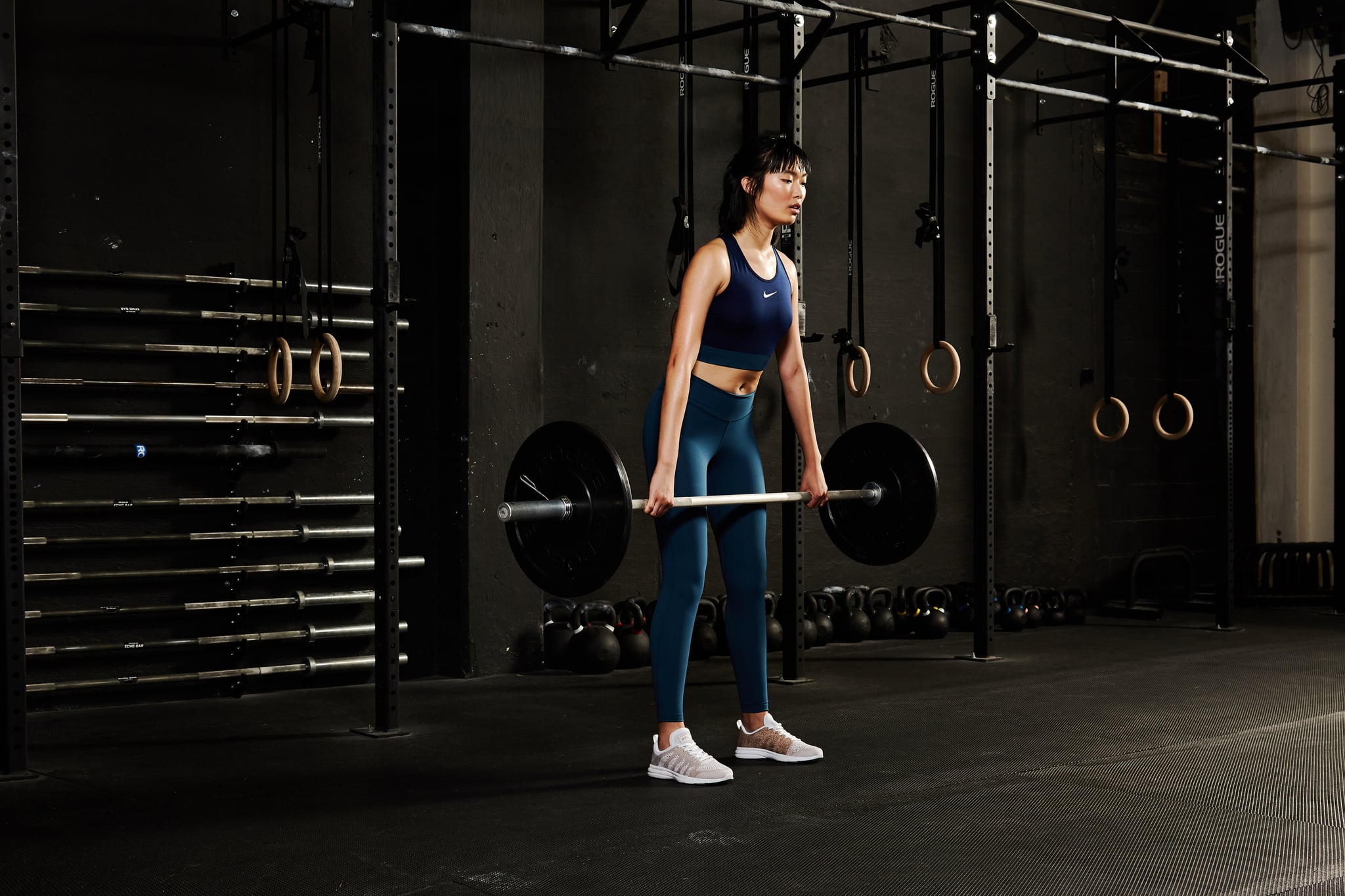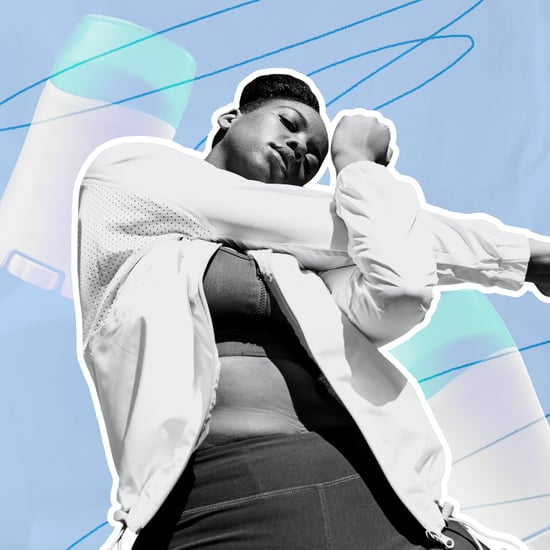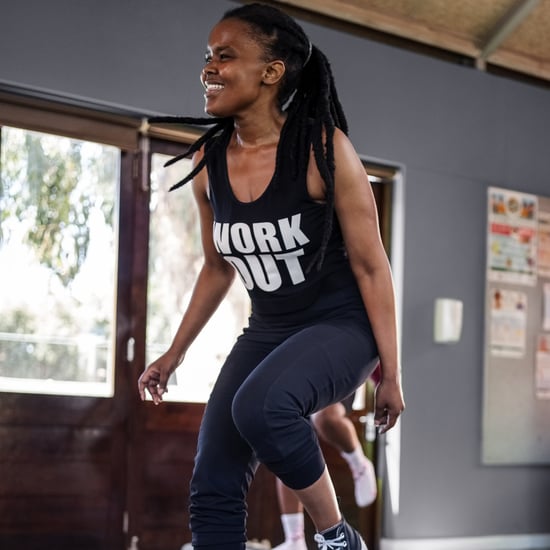Vegan Weightlifting Myths
The Biggest Myths About Being a Vegan Lifter You Need to Stop Believing

When people think of weightlifters, they usually envision steroid-using, superjacked bros who down chicken breasts and cans of tuna every hour, on the hour. And while protein and weightlifting do go hand in hand, the idea that you have to eat animal protein in order to see progress in the gym and muscle gains is simply outdated.
With high-profile athletes such as NBA star Kyrie Irving and tennis pro Venus Williams following a vegan diet, it is possible to eschew animal products and still be at the top of your fitness game, especially if you're lifting weights. Here are some of the biggest myths people have about vegan weightlifters.
You Won't Eat Enough Protein
It's true that animal products have a high concentration of protein. After all, one cup of diced chicken breast boasts 43 grams of it. But it is possible to get enough of this important macronutrient while eating vegan.
"The biggest misconception is that you can't get enough protein on a plant-based diet," said Hunter Healy, ACE. "Legumes, tofu, and nut butter are all fantastic ways to meet the protein demands of weight training."
Loading up on other protein-rich vegan foods such as lentils, quinoa, amaranth, and veggie burgers are all excellent ways to get your protein fill for the day. And although animal proteins are a complete protein, meaning they contain all nine essential amino acids that your body can't produce on its own — your body uses amino acids to build and repair tissue — it is possible to get all of the essential amino acids with a plant-based diet. Soy is the only vegan complete protein, but you can get all nine essential amino acids through food combinations. Jim White, RD, ACSM, and owner of Jim White Nutrition and Fitness Studios, recommends beans and rice, peanut butter and whole-grain bread, or hummus with pita bread.
You'll Need to Take Supplements
Along with the misconception that you're not eating enough protein, people assume they'll need to load up on vegan protein powders and other supplements to achieve their fitness goals.
"One of the myths that I frequently hear is that those who lift weights need to consume protein powder and special supplements in order to build muscle. This is not necessarily the case," said Christen Cupples Cooper, EdD., RD, director of nutrition and dietetics at Pace University. Although adding a vegan protein powder to your diet is a great way to get a boost of protein, it's not necessary; Dr. Cooper explained that it's totally doable to eat enough plant-based, protein-rich foods in your diet and not rely on something out of a tub.
You Won't Build Muscle
With the assumed lack of protein, people often think that it's near impossible to build muscle on a vegan diet. But if Venus Williams's sculpted physique is any indication, this is completely false.
"To increase muscle mass in combination with physical activity, it is recommended that a person that strength and endurance trains regularly eat a range of 0.5 to 0.8 grams of protein per pound of bodyweight," White explained. So a 150-pound person should eat 75-120 grams of protein a day.
That may seem like a lot, but he recommends one way to get your fill of protein for the day is by eating five or six small meals. And be sure your meals also include a variety of fruits, vegetables, whole grains, nuts, and plenty of water for total-body health. In addition to protein, White also recommends that more than half of your calories each day should come from quality carbs, such as whole grains, fruits, vegetables, and legumes, to fuel your muscles.
You Won't Have Enough Energy For Your Workouts
For some people, the idea of a vegan diet is synonymous with deprivation; people assume you'll be eating less and be constantly tired and lethargic. When it comes to eating plant-based, however, this couldn't be further from the truth.
"The power for workouts generally comes from carbohydrates and fats, not from protein," explained Amy Shapiro, MS, RD, and founder of Real Nutrition. "Grains, fruits, vegetables, oils, and nuts all contain carbs and fat. Protein is needed for muscle growth and repair but not for power or performance." If you're eating a diet rich in complex carbs and healthy fats, you should have more than enough energy to power through your sweat session.
You'll Miss Out on Important Nutrients
It's true that meat is an important source of iron, B vitamins, and zinc, all of which can help you perform and recover. And Shapiro explains that some vegans may have a tough time getting their fill of iron since plant-based iron isn't absorbed as well as animal-based iron. But she says that loading up on iron-rich foods such as raisins, fortified cereals and breads, beans, lentils, soybeans, and leafy green vegetables, as well as taking an iron supplement if you need it, should help.
Some good vegan sources of B vitamins include nutritional yeast, wheat germ, tahini beans, bananas, peanut butter, and flax, while zinc can be found in beans, legumes, nuts, and seeds.
Just because you've given up animal products doesn't mean you need to abandon your weightlifting efforts. If anything, you'll have more energy and less chronic disease than your meat-eating peers.







